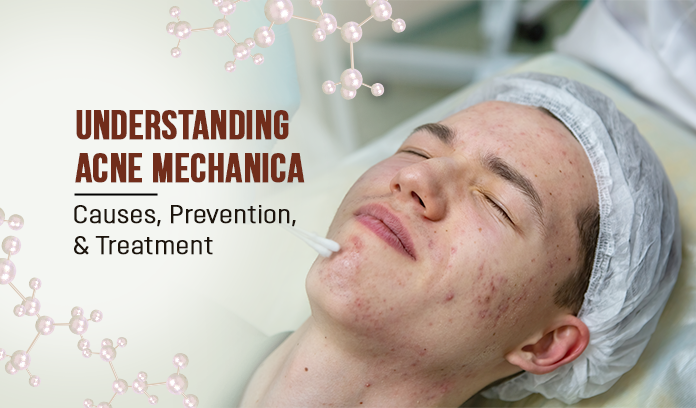While many are aware of typical acne causes, such as genetic influences and hormonal changes, a lesser-known but equally frustrating culprit is acne mechanica. This form of acne is often overlooked, but it can be particularly discomforting.
At AcneWiki, we’re determined to provide you with information on all things acne, including this lesser-known variant.
What Is Acne Mechanica?
Acne mechanica is a type of acne resulting from friction, pressure, or heat applied to the skin. It occurs when external factors irritate the skin and trap hair follicles, leading to the formation of pimples, blackheads, or whiteheads.
While it’s commonly associated with athletes, it can affect anyone, especially those who wear tight clothing, backpacks, and helmets, or partake in activities that cause friction on the skin.
Causes Of Acne Mechanica
Friction: Incessant rubbing of the skin, whether from clothing, sporting equipment, or accessories, can lead to acne mechanica. The constant friction can cause skin irritation and trigger breakouts.
Heat and Sweat: Excessive heat and sweat can create a moist environment on the skin, ideal for the growth of acne-causing bacteria. This is why athletes, who often sweat profusely during training, are particularly susceptible.
Pressure: Continued pressure on the skin, like the one exerted by backpack straps or helmets, can clog pores and cause acne mechanica over time.
Prevention and Acne Mechanica Treatment
Choose breathable fabrics: Moisture-wicking fabrics are well-suited for physical activities. This helps reduce excessive friction and sweat on the skin.
Regular cleansing: After workouts that cause excessive sweating, cleanse your skin gently with a mild, non-comedogenic cleanser to remove sweat and bacteria.
Limit tight clothing: Loose-fitting clothing can reduce friction and irritation.
If you need to wear tight sports gear, consider applying a sweat-absorbing fabric under the equipment to minimize contact with the skin.
Hydration and moisturization: Keep your skin hydrated using a lightweight, oil-free moisturizer to maintain skin health and reduce the risk of inflammation.
Over-the-counter products: For mild cases of acne mechanica, over-the-counter topical applications containing salicylic acid or benzoyl peroxide can be effective. These ingredients help unclog pores and fight inflammation.
Seek a dermatologist: If your acne mechanica persists, consult a dermatologist for more tailored treatment options, such as prescription-strength topical medications or oral antibiotics.
Conclusion
While acne mechanica prevention may not be as popular as other forms of acne, it can be just as gruesome. Understanding its causes and taking proactive measures can help you keep breakouts at bay.
At AcneWiki, we’re committed to providing you with information and solutions for all types of acne, including acne mechanica. Remember that with the right approach and skincare regimen, you can achieve clear and healthy skin, even when faced with friction and pressure.











